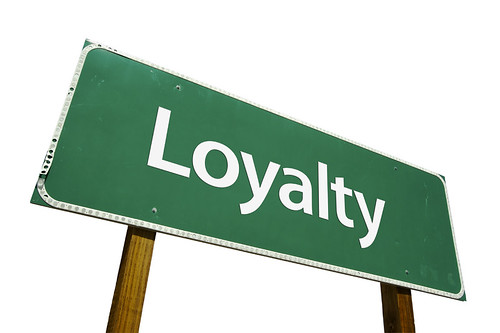Find and fix customer problems by hiring a Customer Advocacy Manager – Interview with Carey Smith and Dave Waltz of Big Ass Fans
October 31, 2014Social leadership and why the C-Suite has to go social – Interview with Ted Coiné and Mark Babbitt
November 9, 2014
Kasia Moreno, editorial director at Forbes Insights, wrote a post the other day called Why Do Companies Undervalue Customer Loyalty?, which recounted an all too familiar situation.
Kasia’s story told how she received two different letters from a magazine that she has been subscribing to for years: one making an offer to her as a new subscriber and the other asking her if she would like to continue her subscription.
Whilst sending her two different letters could be put down to a clerical or admin error, the ‘rub’ of it all was that she was offered better terms as a new subscriber.
It’s these sort of tactics (offering better deals to new customers) that force many customers to question their loyalty to a particular firm and, many would argue, are at the root of the perceived decline in customer loyalty in business today.
Others would say that’s only part of the picture and that they believe that customers are becoming increasingly disloyal.
I’m not sure I agree with that. I believe that many customers want to be loyal. The problem is that many companies are not that deserving of their loyalty.
Loyalty, from a customer perspective, allows us not to have to keep looking for new suppliers and not to have to keep making choices. All of which requires time, attention, energy and a degree of risk.
Therefore, I believe that it is there to be fostered.
Kasia’s article goes on to highlight a number of problems and challenges that firms face with their customer loyalty initiatives, including a multiplicity of systems, fragmentation of data and a lack of communication and cooperation across organisational silos.
But, if companies addressed all of these problems would that solve their customer loyalty issues?
I don’t think so.
So, what must firms do to give themselves a good chance of building loyalty with their customers?
A conversation that I had recently had with loyalty expert Steve Sims, Chief Design Officer & Founder of Behavior Lab at Badgeville offers some clues. Through his research and experience, Steve says that:
- Many, if not most, businesses design their loyalty programmes for their own benefit and fail to take into account what customers want.
- To design a good loyalty programme, businesses really need to understand their customers as people, their motivations, their context and frequency if they are design a loyalty programme that works better.
- Loyalty is a lot like a habit. This has a lot to do how we tend to look for patterns and consistency on a conscious and sub-conscious (habit) level and, also, our natural tendency to move towards things that are rewarding to us or away from things that are threatening to us. Therefore, the more positive experiences that a customer has with a business, the more likely that their cumulative experiences will develop into a habit.
- However, even good loyalty programmes suffer from habituation over time as novelty and interest falls. However, defaulting to traditional, tactical, episodic marketing campaigns to sustain interest over time is unlikely to work and firms need to innovate and think both creatively and strategically if they are build and sustain their customer loyalty.
Steve’s insights offer some broad conclusions for businesses thinking about redesigning or revamping their customer loyalty strategies, programmes and initiatives:
- Put your customer, not your business, at the heart of your loyalty strategy and programme;
- Understand your customer as a person, not just as a ‘wallet’;
- Realise that your customer experience is just as important to your customer loyalty as your loyalty programme is; and
- Like any relationship, if your loyalty programme doesn’t change over time then your customers are likely to lose interest.
This post was originally published on Forbes.com here.
Photo Credit: enriqueburgosgarcia via Compfight cc




6 Comments
Adrian,
A slightly off tangent thought but your phrase not just as a ‘wallet’ is an interesting one.
How many organisations talk about:
– Share of wallet
– Accounts
– Policies
And neglect the word customer altogether. What does that sort of internal language do for the way we think about customers and their loyalty?
James
Hi James,
I agree. You can call me a pedant, if you like, but I think the words that we use to describe things have a huge impact on how we view things and what we do.
Taking things further, you could extend and apply that thinking to the word customer, consumer or client as well. How does the use of these terms affect the way that we think about our customers? Would it make it any difference if we just starting talking about people that we do business with as ‘people’ or fellow human beings?
I don’t know but something to think about. What do you think?
Adrian
Adrian,
Two things…
1. Companies should prioritize retention over acquisition, though the latter is important, too.
2. Companies need to get out of the business of discounting and deliver value instead. (Who created this “discount monster?” Which came first, companies offering discounts or customers demanding and only buying when there were discounts?)
Annette 🙂
Sorry, I should have said, “companies relying on discounts” … not “offering”
Hi Annette,
But, if we asked companies to tell us how their marketing budget, say, is split between retention and acquisition I am pretty sure that the majority of them would say that the majority of their spend/focus was on acquisition. Does that tell us that acquisition is harder and more expensive? Perhaps. But it could also say something about their priorities too.
Adrian
I would agree… that is absolutely how the majority spend their budgets, on acquisition. And I think it does speak to their priorities.